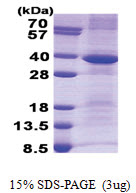Cathepsin S (17-331, His-tag) Human Protein
Other products for "CTSS"
Specifications
| Product Data | |
| Species | Human |
| Expression Host | E. coli |
| Expression cDNA Clone or AA Sequence |
MGSSHHHHHH SSGLVPRGSH MQLHKDPTLD HHWHLWKKTY GKQYKEKNEE AVRRLIWEKN LKFVMLHNLE HSMGMHSYDL GMNHLGDMTS EEVMSLMSSL RVPSQWQRNI TYKSNPNWIL PDSVDWREKG CVTEVKYQGS CGACWAFSAV GALEAQLKLK TGKLVSLSAQ NLVDCSTEKY GNKGCNGGFM TTAFQYIIDN KGIDSDASYP YKAMDQKCQY DSKYRAATCS KYTELPYGRE DVLKEAVANK GPVSVGVDAR HPSFFLYRSG VYYEPSCTQN VNHGVLVVGY GDLNGKEYWL VKNSWGHNFG EEGYIRMARN KGNHCGIASF PSYPEI
|
| Tag | His-tag |
| Predicted MW | 38.1 kDa |
| Concentration | lot specific |
| Purity | >85% by SDS - PAGE |
| Presentation | Purified |
| Buffer | Presentation State: Purified State: Liquid purified protein Buffer System: 20 mM Tris-HCl buffer (pH 8.0) containing 0.4M urea, 10% glycerol |
| Preparation | Liquid purified protein |
| Protein Description | Recombinant human CTSS protein, fused to His-tag at N-terminus, was expressed in E.coli. |
| Storage | Store undiluted at 2-8°C for one week or (in aliquots) at -20°C to -80°C for longer. Avoid repeated freezing and thawing. |
| Stability | Shelf life: one year from despatch. |
| Reference Data | |
| RefSeq | NP_001186668 |
| Locus ID | 1520 |
| UniProt ID | P25774 |
| Cytogenetics | 1q21.3 |
| Summary | The preproprotein encoded by this gene, a member of the peptidase C1 family, is a lysosomal cysteine proteinase that participates in the degradation of antigenic proteins to peptides for presentation on MHC class II molecules. The mature protein cleaves the invariant chain of MHC class II molecules in endolysosomal compartments and enables the formation of antigen-MHC class II complexes and the proper display of extracellular antigenic peptides by MHC-II. The mature protein also functions as an elastase over a broad pH range. When secreted from cells, this protein can remodel components of the extracellular matrix such as elastin, collagen, and fibronectin. This gene is implicated in the pathology of many inflammatory and autoimmune diseases and, given its elastase activity, plays a significant role in some pulmonary diseases. Alternatively spliced transcript variants encoding distinct isoforms have been found for this gene. [provided by RefSeq, May 2020] |
| Protein Families | Druggable Genome, Protease |
| Protein Pathways | Antigen processing and presentation, Lysosome |
Documents
| FAQs |
| SDS |
Resources
Recombinant Protein Resources |
{0} Product Review(s)
0 Product Review(s)
Submit review
Be the first one to submit a review
Product Citations
*Delivery time may vary from web posted schedule. Occasional delays may occur due to unforeseen
complexities in the preparation of your product. International customers may expect an additional 1-2 weeks
in shipping.






























































































































































































































































 Germany
Germany
 Japan
Japan
 United Kingdom
United Kingdom
 China
China
